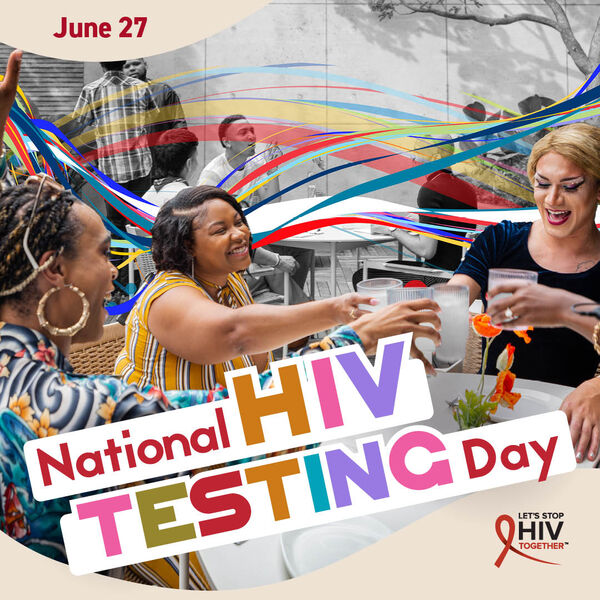
2024 National HIV Testing Day: Prioritizing Black Women in HIV Testing Efforts
June 27 marks National HIV Testing Day, a pivotal moment each year to encourage people to get tested for HIV, know their status, and get linked to prevention, care and/or treatment. First observed on June 27, 1995, this day aims to increase awareness and promote testing as a critical step in HIV prevention and care. The theme for 2024, “Level up your self-love: check your status” emphasizes valuing yourself, showing yourself compassion and respect, and honoring your health needs with self-love.
This year, NASTAD is proud to link this important day with our 2024-2025 Chair’s Challenge, "Black Women and BIPOC Leaders: Breaking Barriers and Building Bridges,” spearheaded by Board Chair, Clover Barnes, Senior Deputy Director of the HIV/AIDS, Hepatitis, STD, and TB Administration at the DC Department of Health. This challenge builds on immediate-past Board Chair Dave Kern’s Chair’s Challenge “Access, Engage, and Activate: Centering and Recentering Key Populations” by focusing on Black women as a key population in the fight to end the epidemic.
The Urgent Need for Action
The statistics speak volumes about the disparities faced by Black women in the context of HIV. In 2021, Black women accounted for 54% of new HIV infections in U.S. women, despite Black women making up less than 15% of the female population. This alarming statistic is compounded by the fact that in 2021, the HIV infection rate among Black women was the highest compared to women of all other races and ethnicities. This disproportionate impact underscores the need for targeted interventions and resources.
Additionally, in 2021, although women comprised 18% of new HIV diagnoses, only 8% of all PrEP users in the U.S. were women, and only an estimated 10-20% of women are aware of PrEP as an intervention. Furthermore, PrEP initiation rates are significantly lower among women than men and significantly lower among Black women than white women. and significantly lower among Black women than white women.
HIV testing serves as the gateway to prevention services, such as PrEP, as well as HIV treatment, which can keep people living with and vulnerable to HIV healthy and help prevent transmission to others. Testing programs with linkage to prevention, care and treatment services have contributed to a 12% decrease in estimated HIV infections from 2018 to 2022, but disparities persist due to lack of access to HIV testing.
Amplifying Efforts to Reach Black Women
National HIV Testing Day serves as a powerful reminder of the importance of knowing one’s HIV status. For Black women and other disproportionately affected groups, accessible and culturally competent testing services are crucial. This day is an opportunity to renew our commitment to providing these services and ensuring that our messages of prevention and care are both heard and trusted.
As part of NASTAD’s 2024 –2025 Chair’s Challenge, we urge health departments to amplify their efforts to reach Black women with targeted HIV testing campaigns. Building strong community partnerships and creating supportive environments where Black women feel safe and empowered to get tested is essential.
In her challenge, Clover emphasizes the need for creating specific community engagement, facilitating discussion and conversation opportunities for Black women, listening to their needs, and implementing programs that meet these needs. A notable example is the collaboration between the DC Health Department and Whitman-Walker in the Beauty Shop Conversations: Beauty IN Wellness initiative, which gathers Black and Brown women to have open discussions about sexual health and health care.
Expanding HIV Self-Testing Programs
HIV self-testing programs like Together TakeMeHome are critical in reaching individuals who have never been tested for HIV and linking people to HIV prevention and care services. The CDC-funded initiative, led by Emory University and its partners, Building Healthy Online Communities (BHOC), OraSure Technologies, Signal Group, and NASTAD, launched in September 2022 to expand a nationwide HIV self-test distribution program with a goal of distributing at least 1 million HIV self-tests over 5 years. This program specifically focused on reaching populations disproportionately affected by HIV, including gay, bisexual and other men who have sex with men (MSM), especially Black and Hispanic MSM, Black cisgender women, and transgender women.
According to a new CDC MMWR, in its first year, the Together TakeMeHome program mailed 443,813 free self-tests to 219,360 people in all 50 states and Puerto Rico, with about one in four recipients reporting that this was their first time ever getting tested for HIV. This demand exceeded initial expectations — strengthening national efforts to reach more people with HIV testing in more places.
This initiative highlights the effectiveness of mail-based self-testing in reaching key groups disproportionately affected by HIV, suggesting that clinicians, community organizations, and public health officials need to be aware of HIV self-test programs in order to better reach Black women.
Building Bridges for the Future
The 2024-2025 Chair’s Challenge is an opportunity for health departments to come together and uplift the voices of those who are often silenced or forgotten. By prioritizing Black women in HIV testing efforts, we can make significant strides toward ending the epidemics of HIV, hepatitis, and other intersecting epidemics.
As we commemorate National HIV Testing Day, let us come together to break barriers and build bridges, ensuring that health equity becomes a reality for all. Thank you for your commitment and efforts. We look forward to the progress we will make in the coming year.
Promoting National HIV Testing Day
To help us promote National HIV Testing Day, download and share resources from CDC’s Let’s Stop HIV Together campaign. Let’s Stop HIV Together is an evidence-based campaign created in English and Spanish that aims to empower communities, partners, and healthcare providers to reduce HIV stigma and promote HIV testing, prevention, and treatment. You can also share social media content from CDC’s digital toolkit using the #HIVTestingDay hashtag and help spread the word about HIV testing opportunities.
Resources: